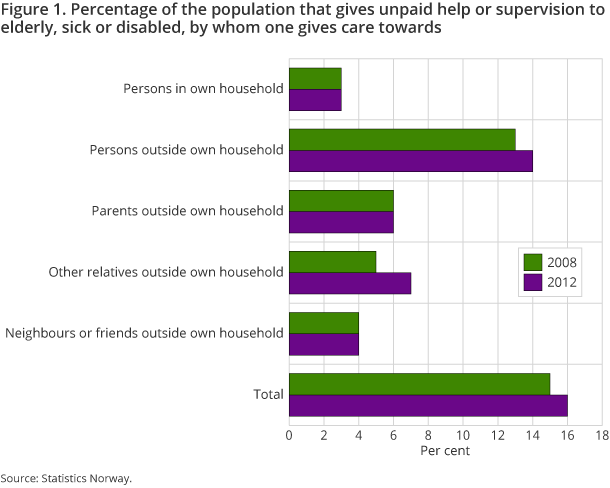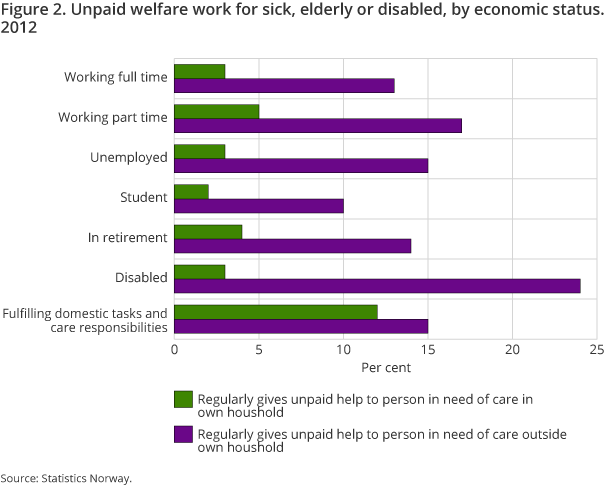Content
Published:
This is an archived release.
One in six providing unpaid care
In the population, there are a large number of persons who provide unpaid welfare work. More than one sixth of the adult population report having performed unpaid help to the elderly, sick or disabled. Among those who provide care, four hours of unpaid help and supervision are performed every week on average.
| 2012 | 2008 - 2012 | |
|---|---|---|
| Share of persons | Change in percentage points | |
| Belongs to houshold where somone needs care or supervision (per cent) | 6 | 2.2 |
| Regularly gives unpaid help, total | 16 | 0.6 |
| Regularly gives unpaid help to person in need of care in own houshold (per cent) | 3 | 0.3 |
| Regularly gives unpaid help to person in need of care outside own houshold (per cent) | 14 | 0.8 |


Survey of level of living on health, care and social contact in 2012 examines the extent of unpaid welfare work given to the elderly, sick and disabled in the population. The result shows that 16 per cent of the population over 16 years has performed unpaid care to either household members or persons outside their household. This is at the same level as previous years.
Four hours of unpaid help per week
Living in a household where someone needs care or supervision is relatively uncommon, and only applies to 6 per cent of the population. Providing practical assistance or supervision to persons outside the household is most common, with 14 per cent of the population in Norway doing this regularly. On average, four hours of unpaid care is performed every week among those providing such assistance. Those living in rural areas, particularly women, provide unpaid help to a greater extent than those living in more urban areas.
Most common to help parents
Providing practical assistance or supervision to a parent is most common, with 8 per cent of the population with living parents doing this regularly. Seven per cent provide regular unpaid help to relatives other than parents, and 4 per cent to neighbours or friends.
It is more common to give parents different forms of practical help than unpaid help in the form of supervision and care. In the course of a four-week period, 9 per cent of the population with parents aged over 67 helped with grocery shopping, 5 per cent helped with cleaning and 10 per cent provided some other kind of practical help. Correspondingly, 5 per cent had provided supervision or care for their parents and 4 per cent had given advice or help in liaising with home care services.
The percentages for persons who have provided unpaid help are consistently higher for women, but the differences are small and statistically uncertain. The biggest difference in providing help for parents is in the form of housework, with 7 per cent of women and 3 per cent of men with living parents reporting having given such help.
Adults do most unpaid care
The proportion that provides regular assistance outside the household is highest for those aged between 45 and 66, and corresponds to 21 per cent. Thirteen per cent of those over 67 also state that they provide regular unpaid help to someone outside their own household. Slightly lower proportions are found among the younger population, where about one in ten aged 16-24 years and 25-44 years perform unpaid welfare work regularly. This is most likely because it tends to be elderly relatives and parents who perform the care work.
Sample and response rateOpen and readClose
Data from The Survey of level of living on health, care and social contact is representative for the population 16 years and older living in private households. A sample of 5 660 persons was interviewed.
Contact
-
Mari Lande With
E-mail: mari.lande.with@ssb.no
tel.: (+47) 98 43 36 65
